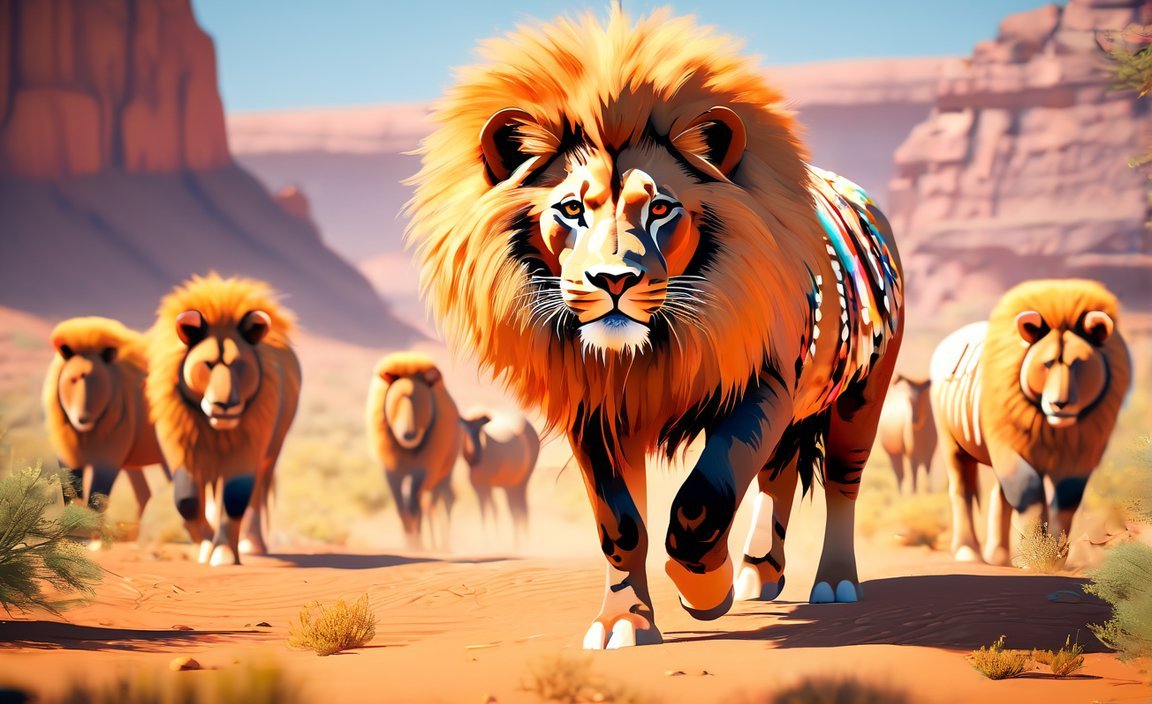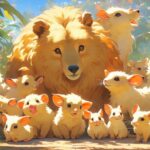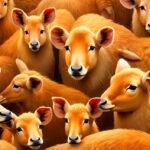Welcome to the fascinating world of Navajo animals, where the intricate wildlife heritage of this ancient culture unfolds before our eyes. In this article, we will embark on a journey of discovery, exploring the diverse range of animal species that call the Navajo lands their home. From the majestic presence of the bison to the nimble agility of the coyote, each creature holds a special place in Navajo traditions and beliefs. Prepare to be captivated by the rich biodiversity and the profound connections between Navajo culture and the enchanting wildlife that thrives in this unique region.
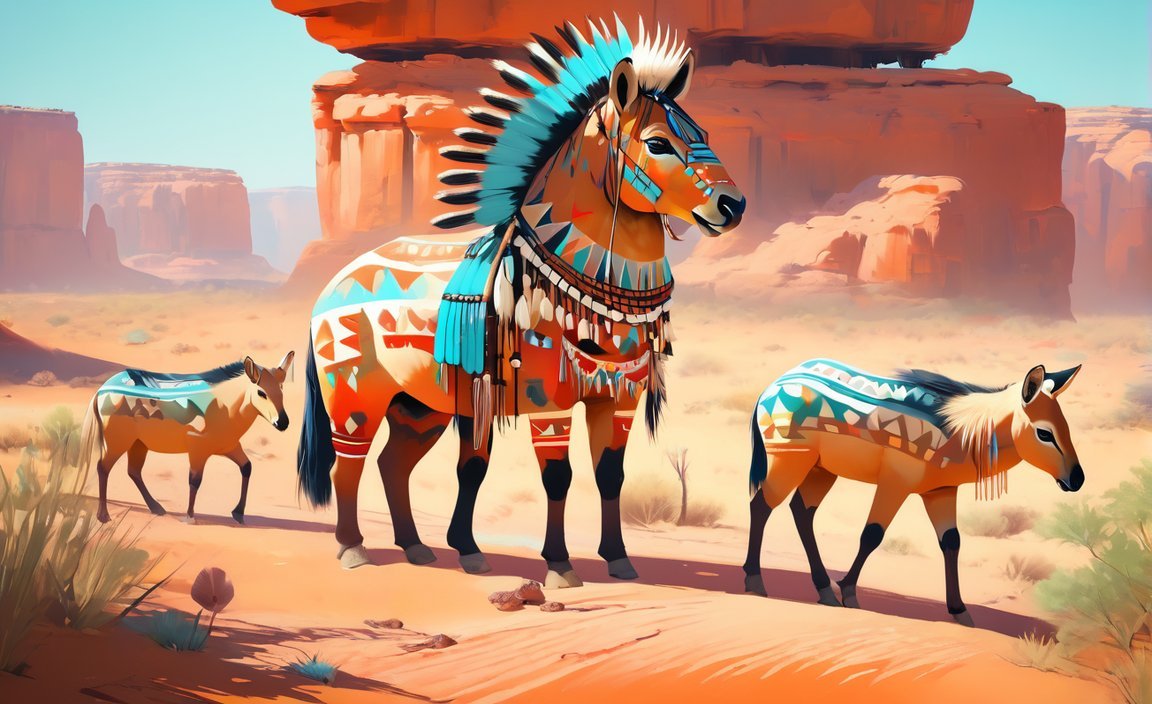
Key Takeaways:
- Animals have various significant associations in Navajo culture and art.
- Many animals are linked to specific taboos in Navajo culture.
- Navajo mythology and artwork often portray animals.
- The Navajo language has distinct words for animals.
- “Animals in Navajo Mythology and Artwork” explores the importance of animals in Navajo culture.
- The Navajo people have a close bond with animals, particularly predatory carnivores.
- The Navajo language is called Diné bizaad, and they refer to themselves as the Diné.
- The Navajo Nation has a Department of Fish and Wildlife dedicated to vertebrate animal conservation.
- The Navajo Nation Zoological and Botanical Park exhibits native animals of the Navajo Nation.
- Churro sheep hold central significance in Navajo life and spirituality.
Navajo Animals: Unlocking the Secrets of Wildlife in Navajo Culture
Animals hold a special place in the hearts of the Navajo people, woven into the very fabric of their culture and traditions. From the towering predators to the smallest crawling creatures, Navajo animals have deep-rooted significance and play vital roles in Navajo mythology, art, and everyday life. In this article, we will embark on a captivating journey through the intricate wildlife heritage of the Navajo Nation, unraveling the extraordinary connections between the animal kingdom and the Navajo people.
The Enigmatic World of Navajo Animals
The Diversity of Animal Associations
In Navajo culture and art, animals possess diverse associations, representing various qualities, characteristics, and lessons for the community. Each animal holds a distinct symbolism and communicates a unique message. For example, the eagle, with its majestic presence and powerful wings, symbolizes strength, courage, and protection. On the other hand, the coyote is seen as a trickster figure, teaching lessons through its mischievous acts.
Taboos and Sacredness
Throughout Navajo culture, animals are also associated with specific taboos. These taboos serve to protect the balance of nature and ensure the well-being of the community. For instance, killing a mountain lion without a justifiable reason is considered taboo as it disrupts the ecosystem and disrupts the delicate balance of nature.
Navajo Mythology and Artwork: Where Animals Come Alive
Exploring Navajo mythology and artwork is like stepping into a vibrant tapestry, where animals come alive with profound stories and symbolism. The Navajo people have rich oral traditions that narrate mesmerizing tales of animals and their interactions with humans. These myths and legends bring the animal kingdom into the realm of human existence, emphasizing the deep connection and interdependence between humans and nature.
The Language of Navajo Animals
To explore the world of Navajo animals, one must delve into the depths of the Navajo language, known as Diné bizaad. Unlike many languages, Diné bizaad holds specific words and terms to describe various animals. These words encapsulate the unique essence of each creature and reflect the profound understanding and respect that the Navajo people have for the animal kingdom.
Conservation Efforts and Preservation
Guardians of the Land: Navajo Department of Fish and Wildlife
The Navajo Nation has taken a proactive stance in preserving its rich biodiversity through the establishment of the Department of Fish and Wildlife. This department focuses on conserving the vertebrate animals that call the Navajo Nation home. Through scientific research, community engagement, and educational programs, they work tirelessly to safeguard the precious ecosystems and ensure the survival of Navajo animals for generations to come.
A Glimpse into Navajo Wildlife: The Navajo Nation Zoological and Botanical Park
To provide a platform for education and awareness, the Navajo Nation Zoological and Botanical Park offers a fascinating glimpse into the native animals of the Navajo Nation. This unique zoo showcases the diverse range of Navajo animals, allowing visitors to witness the beauty and majesty of these creatures up close. It serves as a reminder of the importance of protecting and preserving the wildlife heritage of the Navajo people.
Churro Sheep: A Spiritual Icon
Among the various animals that hold significance in Navajo culture, Churro sheep stands out as a true icon. These sheep are not only a vital part of Navajo life, providing wool for rugs and blankets, but they also hold spiritual significance. They are believed to symbolize abundance, resilience, and the deep connection between the Navajo people and the land they inhabit.
Uncovering the Mysteries of Navajo Animals
As we conclude our journey through the captivating world of Navajo animals, we stand in awe of the intricate connections between Navajo culture and the wildlife that surrounds it. From the rich mythology and symbolic representations to the dedicated conservation efforts, the Navajo people have cultivated a profound understanding and reverence for their animal counterparts. The wisdom and teachings embedded within the realm of Navajo animals guide us towards a harmonious coexistence with the natural world, reminding us of the importance of cherishing and protecting the wildlife heritage that enriches our lives.
[NOTE: Please provide a break here before the next section/paragraph.]
Here are some interesting links that you can explore:
- where time was transcendent Utah: Discover an enchanting place where time seems to stand still in Utah.
- coe fulmer miles: Uncover the achievements and contributions of Coe Fulmer Miles.
- james a. watson jr.: Dive into the life and legacy of James A. Watson Jr.
- saint West Indies nation NYT: Experience the rich culture and history of the Saint West Indies nation as documented by the New York Times.
- lebron James kindergarten: Explore the early educational journey of LeBron James, from the very beginning.
- Stretch vs windup: Learn about the contrasting pitching techniques of stretch and windup in the world of baseball.
- what age did Michael Jordan start playing basketball: Find out at what age the basketball legend Michael Jordan started his journey in the sport.
Feel free to click on any of the links above to dive into fascinating topics!
Common and Endangered Navajo Animal Species
The Navajo Nation is a land of remarkable biodiversity, home to a wide range of common and endangered animal species. These creatures play a crucial role in both the ecosystem and the rich cultural heritage of the Navajo people. In this article, we will explore the fascinating world of Navajo animals and delve into the efforts being made to protect and preserve their populations.
Exploring Navajo Animals: The Intricate Wildlife Heritage
The Navajo Nation is blessed with an abundance of wildlife, including species that are both common and endangered. These animals have long been an integral part of Navajo culture, holding deep symbolism and cultural significance. They are not merely creatures to be observed; they are revered as sacred beings, and their presence is intertwined with the daily lives and traditions of the Navajo people.
Key Takeaways:
– The Navajo Nation is home to a diverse range of common and endangered animal species.
– Navajo animals hold immense cultural and symbolic importance.
– Efforts are being made to protect and preserve these animal populations.
Common and Endangered Navajo Animal Species: A Glimpse into the Rich Biodiversity
Among the common animal species found in the Navajo Nation are the majestic Gray Wolf, the sleek Black-footed Ferret, and the awe-inspiring Grizzly or Brown Bear. These creatures embody the wild beauty of the Navajo landscape and serve as a reminder of the coexistence between humans and nature that has characterized the Navajo way of life for centuries.
Unfortunately, some of these remarkable animals are on the brink of extinction. The Navajo Nation Department of Fish and Wildlife has identified several endangered species that require immediate attention and conservation efforts. The Bonytail fish, once abundant in the Navajo Nation’s waterways, now teeters on the edge of disappearance. Its survival depends on the dedication and commitment of conservation programs and initiatives.
Conserving Navajo Animal Species: A Collective Effort
The Navajo Nation recognizes the importance of safeguarding the diversity and abundance of its animal species. Through the tireless work of the Navajo Nation Department of Fish and Wildlife, programs and initiatives have been established to protect and monitor these precious creatures. Conservation efforts are focused not only on the endangered species but also on the overall well-being of the Navajo animal population.
The Navajo Nation Endangered Species List provides a comprehensive categorization of species based on their status, allowing for targeted conservation strategies and resources allocation. This holistic approach ensures that every effort is made to preserve the intricate wildlife heritage of the Navajo people.
The Future of Navajo Animals: A Call to Action
The fate of Navajo animals rests in our hands. As stewards of the land, it is our responsibility to protect and conserve these remarkable creatures for future generations. By supporting conservation programs, spreading awareness, and actively participating in efforts to preserve biodiversity, we can make a difference.
Let us remember the sacred connection the Navajo people have with their animal counterparts. Their survival is intertwined with the well-being of the Navajo culture and the ecological balance of the land they call home. Together, let us ensure that common and endangered Navajo animal species continue to thrive and inspire future generations with their untamed beauty.
Key Takeaways:
– Collaborative efforts are vital in conserving Navajo animal species.
– The Navajo Nation Department of Fish and Wildlife plays a crucial role in protecting these creatures.
– Conservation programs and initiatives aim to preserve the intricate wildlife heritage of the Navajo people.
Sources:
– Navajo Nation Department of Fish and Wildlife: Endangered Species List
– WCS Newsroom: Conservation Efforts on the Navajo Nation
Traditional Navajo Animal Symbolism and Stories
The Navajo tribe, known for their rich cultural traditions, holds a deep reverence for animals and often uses their symbolism to represent various aspects of their beliefs. In Navajo culture, animals are seen as more than just physical beings; they embody spiritual qualities and communicate important messages to the tribe. Let’s explore the symbolism of three significant animals in Navajo culture: the buffalo, the owl, and the hummingbird.
Buffalo Symbolism
The buffalo holds great importance in Navajo culture as it represents the bounties of the earth. The Native Americans utilize the buffalo in various ways, such as using its meat for food and its milk as a source of sustenance. They also make clothing from the buffalo’s hides and even use them as assistance in ploughing fields. But the Navajo perceive the buffalo not just by its appearance but primarily by its actions, emphasizing the idea of judgment based on behavior rather than superficiality.
Owl Symbolism
Although lesser known, the owl symbolizes wisdom according to multiple Native American tribes, including the Navajo. However, the Navajo’s interpretation of owls as symbols challenges the popular notion of owls being wise creatures. The Navajo view owls as untrustworthy creatures that often spy for witches and evil spirits. This unique interpretation of owls as symbols of deceit highlights the diversity of symbolism across Native American tribes.
Hummingbird Symbolism
In addition to the buffalo and owl, the Navajo people also associate symbolism with the hummingbird. Despite its small size, the hummingbird symbolizes devotion, permanence, and eternity. The Navajo observed that hummingbirds possess enduring qualities, indicating their belief in the significance of persistence and dedication, no matter how small one may seem.
Importance of Animal Symbols to the Navajo Tribe
Animal symbols hold a significant place in Navajo culture as they represent the essence of what the tribe sees in the world. Rather than solely judging by appearances, the Navajo value animal symbolism based on the creatures’ actions and behaviors. This approach reflects their holistic and thoughtful perspective on the world, emphasizing the importance of recognizing the intrinsic value of living beings beyond superficial appearances.
By delving into the rich symbolism of animals in Navajo culture, we can gain a deeper understanding of the tribe’s spiritual connection with the natural world and the value they place on observing actions and behaviors rather than surface-level appearances.
Key Takeaways:
- The buffalo symbolizes the bounties of the earth and is valued for its various uses in Navajo culture.
- The owl, contrary to common belief, represents deceit in Navajo symbolism, challenging the popular notion of owls as wise creatures.
- The hummingbird symbolizes devotion and permanence, despite its small size.
- Animal symbols represent the essence of the Navajo tribe’s worldview, emphasizing the value of behavior and actions over appearances.
Explore more about Navajo symbols and their meanings.
Learn about animals in Navajo mythology and artwork.
Conservation Efforts for Navajo Animals
The Navajo Nation, with its rich biodiversity and deep cultural connections to animals, is actively engaged in conservation efforts to protect its wildlife heritage. Through collaborations with organizations like the Wildlife Conservation Society and the Best Friends Animal Society, the Navajo Nation’s Department of Fish and Wildlife is working towards conserving, protecting, enhancing, and restoring the fish, wildlife, and plants of the Navajo Nation. Here, we will explore the conservation efforts being made to safeguard Navajo animals and their habitats.
Navajo Nation Tags Nearly 100 Bighorn Sheep
In a significant milestone, scientists working with the Navajo Nation have successfully tagged nearly 100 Tsétah dibé, or bighorn sheep, providing valuable data for conservation efforts. This tagging initiative allows researchers to monitor the movements and behaviors of these iconic animals, aiding in the development of effective conservation strategies.
Collaborative Conservation Programs
The Navajo Nation recognizes the importance of collaborative efforts in conserving their animal species. Partnering with organizations like the Wildlife Conservation Society and the Best Friends Animal Society, the Navajo Nation Department of Fish and Wildlife is able to leverage resources, expertise, and funding to implement conservation programs and initiatives. These collaborations support research, monitoring, and preservation efforts, ensuring the long-term survival of Navajo animals.
Spiritual and Cultural Significance
Animals hold immense spiritual and cultural significance in Navajo traditions. The Navajo people believe that animals are protectors of the doorway and listeners of the earth, emphasizing their deep connection and interdependence with nature. The conservation of Navajo animals is not only crucial for ecological balance but also for preserving cultural heritage and traditional practices.
Protecting Endangered Species
The Navajo Nation Department of Fish and Wildlife conducts surveys and assessments to monitor and protect rare and sensitive plant and animal populations. They have identified several endangered species that require immediate attention and conservation efforts. By categorizing these species and implementing targeted conservation strategies, the Navajo Nation aims to protect and restore their populations, ensuring their survival for future generations.
Allocation of Funds
To support the protection of Navajo wildlife and its heritage, it is essential for Congress to allocate funds for conservation efforts. In an opinion piece published in the New York Times, it is argued that Indian country, including the Navajo Nation, requires financial support to safeguard its wildlife heritage. Allocating funds would enable the Navajo Nation to implement more robust conservation programs, enhance research and monitoring efforts, and develop sustainable management practices.
The Role of Individuals
The fate of Navajo animals also relies on the responsibility of individuals to actively participate in conservation efforts. Supporting conservation programs, spreading awareness about the importance of Navajo animals, and engaging in sustainable practices can make a significant difference. Each individual can contribute to the preservation of the intricate wildlife heritage that holds immense value for the Navajo people.
Key Takeaways:
- The Navajo Nation’s Department of Fish and Wildlife collaborates with organizations like the Wildlife Conservation Society and the Best Friends Animal Society for conservation efforts.
- Animals hold spiritual and cultural significance in Navajo traditions, emphasizing the deep connection and interdependence between humans and nature.
- The Navajo Nation engages in tagging initiatives and collaborative programs to monitor and protect their animal species.
- Endangered species are identified and targeted conservation strategies are implemented to ensure their survival.
- Allocating funds from Congress is crucial for supporting the protection of Navajo wildlife and its heritage.
- Individual participation in conservation efforts is essential for the preservation of Navajo animals and their intricate wildlife heritage.
Source:
1. Scientists working with Navajo Nation tag nearly 100 (Phys.org)
2. Indian Country Needs Money to Protect Its Wildlife Heritage. Congress Must Help. (New York Times)
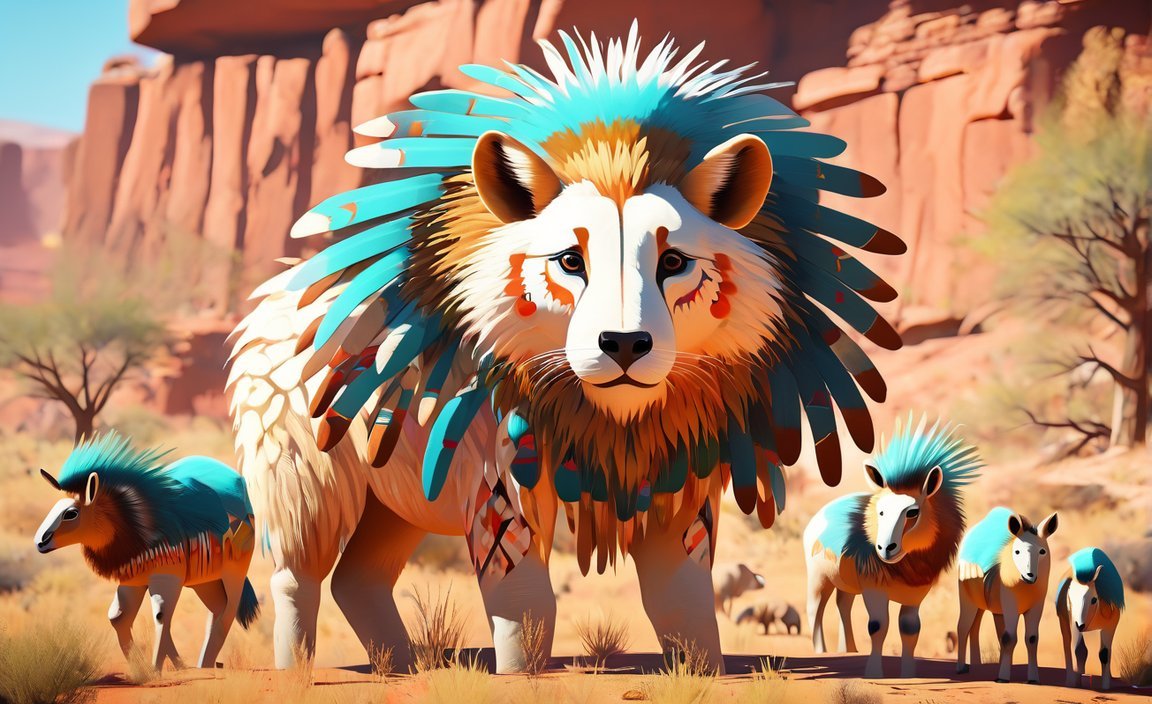
FAQ
Q1: How are animals depicted in Navajo culture and art?
A1: Animals have significant associations in Navajo culture and art. They are often featured in Navajo mythology and artwork, symbolizing various aspects of the tribe’s beliefs and traditions.
Q2: Are there any taboos associated with specific animals in Navajo culture?
A2: Yes, many animals in Navajo culture are associated with specific taboos. These taboos vary depending on the animal and its symbolic significance in Navajo beliefs.
Q3: Does the Navajo language have specific words for animals?
A3: Yes, the Navajo language, known as Diné bizaad, has specific words for different animal species. This reflects the close relationship the Navajo people have with animals and their cultural importance.
Q4: What conservation efforts are in place to protect Navajo animal species?
A4: The Navajo Nation has a Department of Fish and Wildlife that focuses on the conservation of vertebrate animals. They have programs and initiatives aimed at protecting and monitoring endangered species and preserving the diverse wildlife found in the Navajo region.
Q5: Are there any endangered animal species in Navajo territory?
A5: Yes, the Navajo Nation has a list of endangered species, which includes animals such as the Gray Wolf, Black-footed Ferret, Grizzly or Brown Bear, and Bonytail fish. Conservation efforts are being made to protect and preserve these endangered species on the Navajo Nation.
